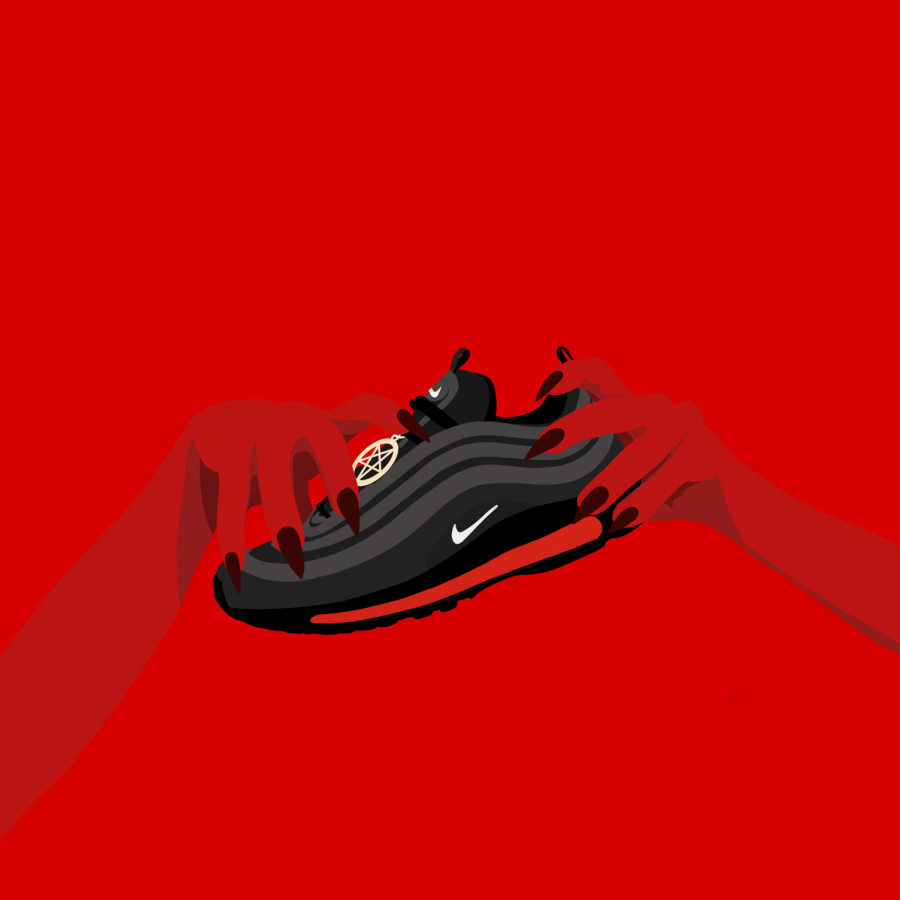Lil Nas X introduces controversial “Satan shoes”
April 7, 2021
MSCHF, an American art collective based in Brooklyn, New York, that has produced an extensive range of artwork, sneakers, social media, photographs and other products, recently teamed up with rapper Lil Nas X to produce a pair of exclusive blood-infused “Satan shoes,” customized from Nike Air Max 97 sneakers. Following a lawsuit filed earlier last week, Nike initiated legal action against MSCHF to bar it from fulfilling any more orders of the sneakers. Nevertheless, MSCHF said that all but one pair of shoes have already shipped; the company’s attorneys added in response to the lawsuit that “MSCHF has no intention of issuing additional ‘Satan Shoes.’”
MSCHF’s “Satan shoes” each sold at $1,018 per pair, embellished with a pentagram and injected with ink as well as a single drop of blood. Nike claims that MSCHF sold its shoes using Nike branding, arguing that the shoe’s devilish nature and design tarnishes Nike’s brand, leading to the lawsuit. If these two parties go to court, it could set a legal precedent for the future of fashion, especially for designers who “upcycle” or consign products. If unfavourable to the art collective, this outcome could adversely affect artistic expression for years to come.
MSCHF’s shoes were released simultaneously with the drop of Lil Nas X’s new video for his song “Montero (Call Me By Your Name).” Mirroring the Luciferian motifs of the shoe, the music video sees Lil Nas X pole-dancing into Hell, seducing Satan and ultimately wearing the shoes himself.
The incident is not the first time MSCHF has customized Nike shoes with religious themes. In 2019, the art collective released a customized Nike shoe infused with holy water at a price of $1,425. MSCHF accuses Nike of singling out the “Satan shoe” when they ignored the “Jesus shoes” sale, undermining their argument that improper use of Nike branding was not the motivating factor towards lawsuit.
Through Nike’s response, we can clearly see that popular or mainstream ideologies such as Christianity, observable in the “Jesus shoes” did not receive as negative a reaction as the “Satan shoes” did. This may be because non-mainstream beliefs are judged which allows people to not freely express themselves. However, artists such as MSCHF have reminded us that Satan is just as much part of the art-historical canon as Jesus. Fashion is an art form that has gone hand in hand with religion for thousands of years.
This controversy raises an important question: if holy water-infused sneakers do not receive hate when they represent the idea of spending money to “walk on water” such as Jesus did, should another religious belief and expression of craft be banned due to it going against convention?






















david mwangize05 • May 2, 2021 at 2:45 am
who created these shoes because if it were that way i would be carrying a bible everyday when am wearing those shoes but am in africa but i cannot do anything
Joseph Paul Bering Jr. MD FACC • Apr 9, 2021 at 5:39 pm
The premise of this article, sarcastically noted in its last paragraph, is asinine and not surprising at all considering contemporary freedom of thought and expression in today’s society, especially on a college campus where progressive orthodoxy prevails and, like livestock feces from a barnyard pen, rolls downhill beginning with many enlightened faculty. MSCHF and the totally irrelevant rap “artist,” if that is how one wishes to refer to Lil Nas X, have the right to espouse Satan worship and promote overpriced “Satan shoes” as afforded them via the 1st Amendment and the free enterprise system.
To defend the idea of Satan worship and defend Lil Nas X’s descent into Hell to perform sodomy with the prince of evil (in fairness to the author, not specifically noted in this article but shown in his latest rap video) is truly an abomination of decent behavior and moral thought nonetheless. Satan hates us all, but how dare I say that in today’s secular world? I suspect I shall need to be “cancelled.”